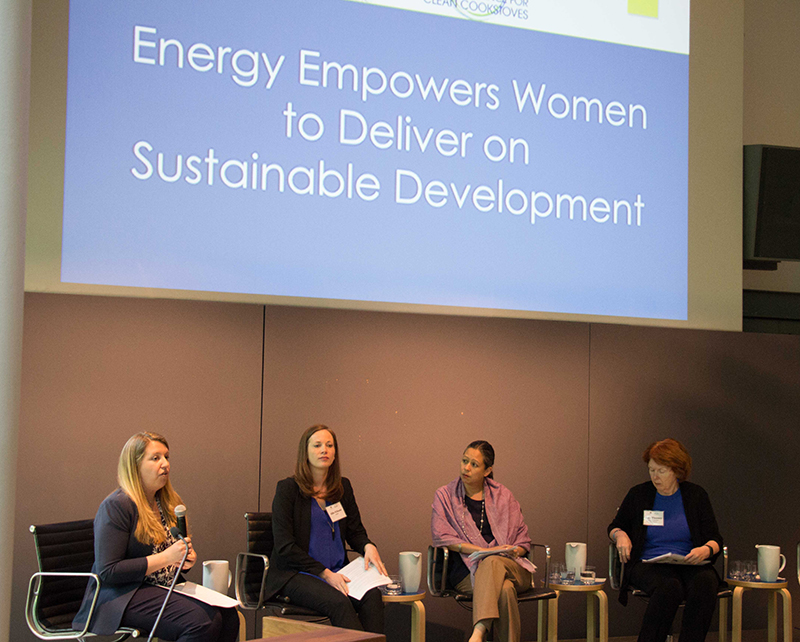Embassy of Finland & Alliance Join Partners to Advocate for Energy Access for Girls and Women
Following on the heels of the Paris agreement signing in April, the Alliance co-hosted an event with the Embassy of Finland on May 10 to advocate for clean energy access as a key driver for sustainable development, particularly for girls and women. Leading up to Women Deliver's fourth annual conference, and in honor of Mother’s Day, leading gender champions came together for a call to action – to ensure that all women around the world who are still spending hours collecting and utilizing dirty fuels to cook, heat, and light their homes, can secure a better future.
Alliance CEO Radha Muthiah facilitated discussions that highlighted how gender equality and energy access are interconnected; in order to achieve the Sustainable Development Goals (SDGs), a more integrated and collaborative approach is necessary. More importantly, energy access enables women to become agents of change in their communities.
Speakers included the Ambassador of Finland to the U.S., Kirsti Kauppi, and Ambassador of Norway to the U.S., Kåre R. Aas, as well as the U.S. Ambassador-at-Large for Global Women’s Issues, Catherine Russell, and the Minister (Commerce) for the Embassy of India to the U.S., Reenat Sandhu. Other leading voices in the gender and energy community included speakers from the World Bank, Women for Women International, Solar Sister, the Women’s Refugee Commission (WRC), Ghana Girl Guides Association, the International Center for Research on Women (ICRW), Johns Hopkins University, and the Alliance. Panelists discussed current evidence-based research, and the best practices from programs that integrate gender and energy access. ICRW’s Gender and Evaluation Specialist, Allie Glinski, stressed the importance of aligning research efforts to get more data that can be used to attract social impact investors. Anita Shankar, Research Associate at the Johns Hopkins University, pointed to a resource developed in collaboration with the Alliance, the Empowered Entrepreneur Training Handbook.
Dr. Shankar highlighted the work of one Alliance partner and Women’s Empowerment Fund grantee, Appropriate Energy Saving Technologies (AEST), which is led by Betty Ikalany in Uganda. AEST is using the Handbook training to enhance women’s empowerment and leadership as clean energy entrepreneurs and has found that selling clean cookstoves and fuels can be a viable livelihood for women entrepreneurs.
Sumi Mehta, Senior Director of Research & evaluation at the Alliance, called for the need to focus on clean cookstoves and fuels as a solution for achieving public health and climate change outcomes- more than four million people die each year as a result of exposure to household air pollution, and dirty and inefficient cooking practices contribute up to 30% of all ambient air pollution.
Zakiya Abdul-Wahab from the Ghana Girl Guides Association shared her experience leveraging and creating entrepreneurial networks for young women – noting that “integrating women into the value chain is a business strategy” and learning opportunities for adolescent girls – underscoring that “girls are showing their ability to be agents of change for sustainable development.”
Caren Grown from the World Bank joined Radha Muthiah and other global gender equality leaders on a final high-level panel, emphasizing the importance of supporting entrepreneurs, working with the private sector, and providing creative financing mechanisms. Bringing these voices together rallied support around the integration of energy access and clean cooking solutions into existing strategies for achieving gender equality. This approach will ensure women and girls thrive by having safe access to fuels and cookstoves, along with the co-benefits generated, including increased economic opportunities, improved health and access to education, extra time at their disposal, and the ability to participate in community decision-making. Urging commitment from organizations to take an integrated approach to empowerment will move the narrative away from framing women and girls as victims, and position them as the powerful, transformative agents for the socio-economic changes necessary for achieving the SDGs.

